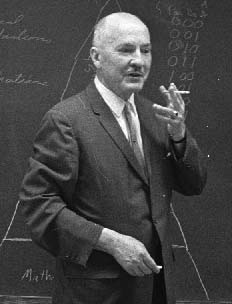Robert A. Heinlein

Before writing SF, Heinlein attended the University of Missouri and the Naval Academy at Annapolis, graduating in 1929. He served five years in the Navy, retiring from active duty after contracting tuberculosis (illnesses would follow him throughout his life). After his Naval discharge (as a lieutenant), he studied physics and mathematics at UCLA.
His first story, "Life-Line", appeared in the August, 1939 edition of Astounding Science Fiction. Heinlein would write stories in large quantity, often using pseudonyms in order to prevent two stories from the"same" author being published in the same edition of a magazine.
Heinlein's work possessed three essentials: well-designed plots, vivid characters and good scientific arguments. He was scientifically precise, and he mixed hard and soft SF and fantasy in various doses, showing that he could create good stories in any area of speculative fiction.
During the WWII, Heinlein temporarily abandoned SF, working on research for high-altitude pressure suits (much like space suits) and radar at the Navy Experimental Air Station in Philadelphia.
Following the war's end, he devoted himself exclusively to writing. From 1948 to 1962 he wrote fourteen"juvenile" SF novels. The last of the Heinlein juveniles holds special interest; Podkayne of Mars (1962) shows a Venus colonized principally by Brazilians, a planet of capitalism carried to an extreme, where, in order to get anything, one has to grease a lot of palms.
Along with the juveniles, Heinlein wrote several adult novels during the 1950s that can be considered veritable gems of"Golden Age" of science fiction, such as The Puppet Masters (1951); Double Star (1956) and The Door into Summer (1957).
One of the juveniles, Space Cadet (1948) was made into a television series, shown between 1951 and 1956; while Rocketship Galileo (1947) served as inspiration for the film Destination Moon (1950), the first film to deal scientifically with the problems of space travel and which influenced many adolescents who would become--years later--the scientists and engineers of NASA. For this and other works, he was posthumously awarded the NASA Medal for Distinguished Public Service.
Stranger in a Strange Land (1961) was adopted by many in the 1960's as an integral part of the"flower" generation. With the incredible and unexpected success of Stranger in a Strange Land (it became the best-selling book in SF history), Heinlein had essentially a free hand to write whatever he wanted to.
He revisited his Future History universe and described the"lives" and loves of Lazarus Long (perhaps most prominent of cult-figure characters among Heinlein's fans) in Time Enough for Love (1973). He"invented" inter-universe travel and the concept of"World-as-Myth" (each fictional universe runs parallel to and is as real as our own, and our own universe is a fiction created by an author from another universe). These concepts allowed the meeting of characters from several of his books (universes) and from those of other authors in the novel Number of the Beast (1980). Heinlein analyzed these themes in his final The Cat Who Walks through Walls (1985) and To Sail beyond the Sunset (1987).
The Moon is a Harsh Mistress (1967), is considered his greatest libertarian work, with intelligent computers, an anarchist professor, Bernardo de la Paz (loosely based on Robert LeFevre), a revolution on the Moon, radical individualism and libertarian themes influenced many libertarians (myself included) in the 1960's-80's. TANSTAAFL, a term from The Moon is a Harsh Mistress, became a libertarian watchword--"There Ain't No Such Thing As A Free Lunch."
Just a thought.
Just Ken
CLASSical Liberalism